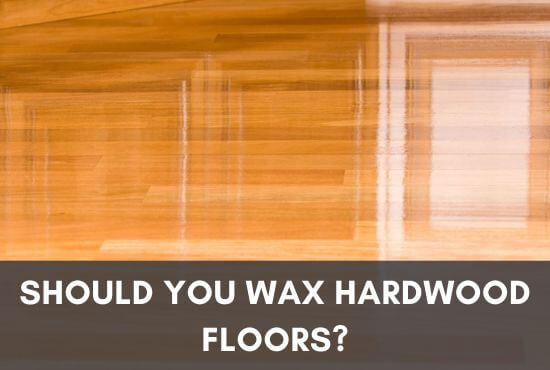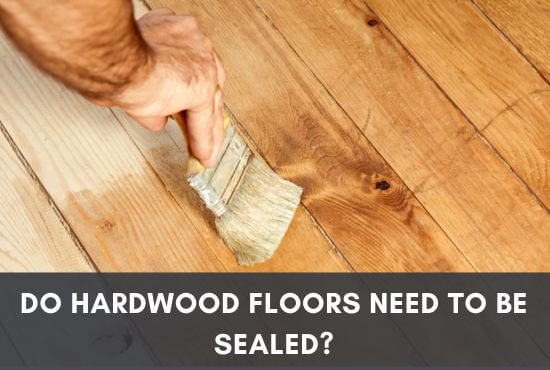Dawn dish soap is a fantastic lubricant. Due to its affordability and adaptability, it has become a domestic necessity in every cleaning aisle.
People use dawn dish wash to clean nearly every surface in and around the home, including cooking surfaces and tiles, in addition to the usual dirty dishes and glasses.
You can use dawn dish soap to remove grime and dirt from hardwood floors if you follow proper guidelines, however, it isn’t mainly intended for hardwood surfaces that require a lot of maintenance. You can use Dawn to clean and maintain hardwood surfaces in the same way as other dish soaps.
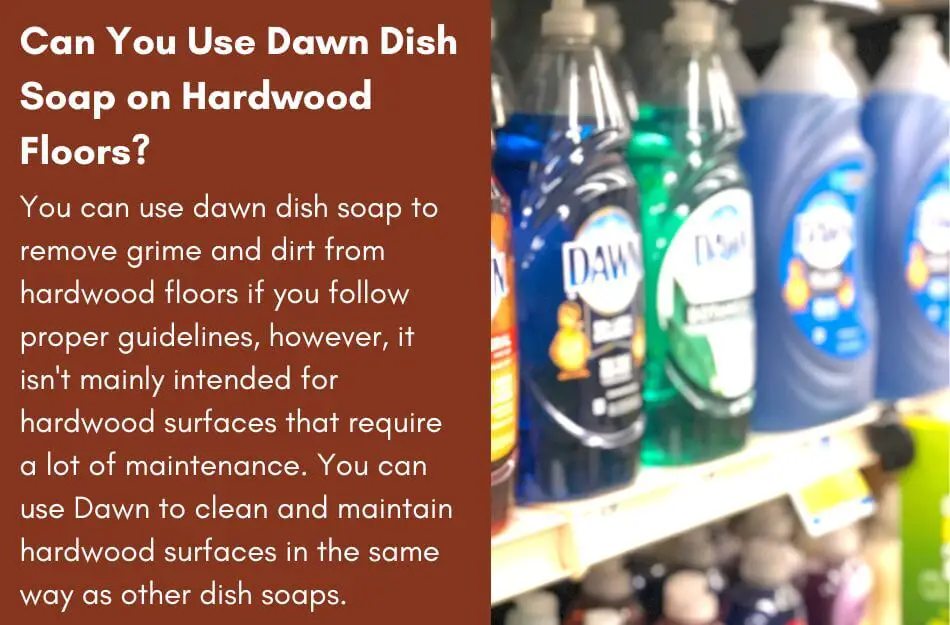
However, you need to pay attention to the concentration and time of application because too much exposure can harm the surfaces.
You should clean hardwood surfaces every two weeks to prevent the accumulation of dirt and grime.
And because Dawn’s formula is so effective at removing fatty and oily substances, it is perfect for such cleanups.
Also Read: Can You Use Lysol Wipes On Hardwood Floors: Yes Or No?
Table of Contents
- 1 Conditions In Which You Must Avoid Dawn Dish Soap
- 2 Can I Use Dish Soap To Mop Hardwood Floors?
- 3 Is Dawn Dish Wash Safe To Use On Hardwood Floors?
- 4 Can You Use Vinegar With Dawn On Hardwood Floors?
- 5 How Do You Clean Hardwood Floors with Vinegar And Dish Soap?
- 6 Cleaning Hardwood Floors With Dish Soap
- 7 Does Dish Soap Ruin Hardwood Floors?
- 8 Can You Use Blue Dawn on Hardwood Floors?
- 9 Is Dawn Dish Wash The Best Hardwood Floor Cleaning Product?
- 10 Can You Use Dawn Dish Wash On All Surfaces?
- 11 Is Dawn Dish Soap Toxic?
- 12 Can Dawn Remove Thick Layers Of Dirt Without Harming The Hardwood Floors?
- 13 Should Dawn Dish Soap Sit For Several Hours If The Floor Looks Dirty?
- 14 Final Thoughts
Conditions In Which You Must Avoid Dawn Dish Soap
It would be best if you did not use Dawn in some situations or avoid some methods. You must first meet the requirements listed below to use Dawn on hardwood floors:
- Avoid mixing Dawn with hot/boiling water because high-temperature solvents react poorly with sealants.
- Thoroughly dust the floor surfaces to remove all the loose dust particles and avoid mudding.
- When cleaning, use microfibre mops, sponges, etc.; avoid anything with pointy brushes or chemicals.
- Check whether the ground has been correctly sealed with water-soluble or oil-based sealant layers.
- Use a 50–75% diluted Dawn solution with water to clean the surfaces of wooden floors.
Can I Use Dish Soap To Mop Hardwood Floors?
If the wood surfaces have been coated with waterproof protective layers, you can mop them with dish soap.
Non-abrasive cleaning agents cannot harm stain-resistant coatings made of polyacrylic, polyurethane, etc.
As a result, it’s acceptable to mop hardwood floors with an appropriate finish using normal Dawn dish soap. Floors can be quickly cleaned and shined with just 2 tbsp of dish soap and a pail of water.
You May Also Like: Will Clorox Wipes Damage Hardwood Floors? An In-Depth Guide
Is Dawn Dish Wash Safe To Use On Hardwood Floors?
Dawn dish wash is safe to use on hardwood floors because Dawn contains a unique blend of surfactants that effectively removes oils and grease from pots and dishes without damaging your floor.
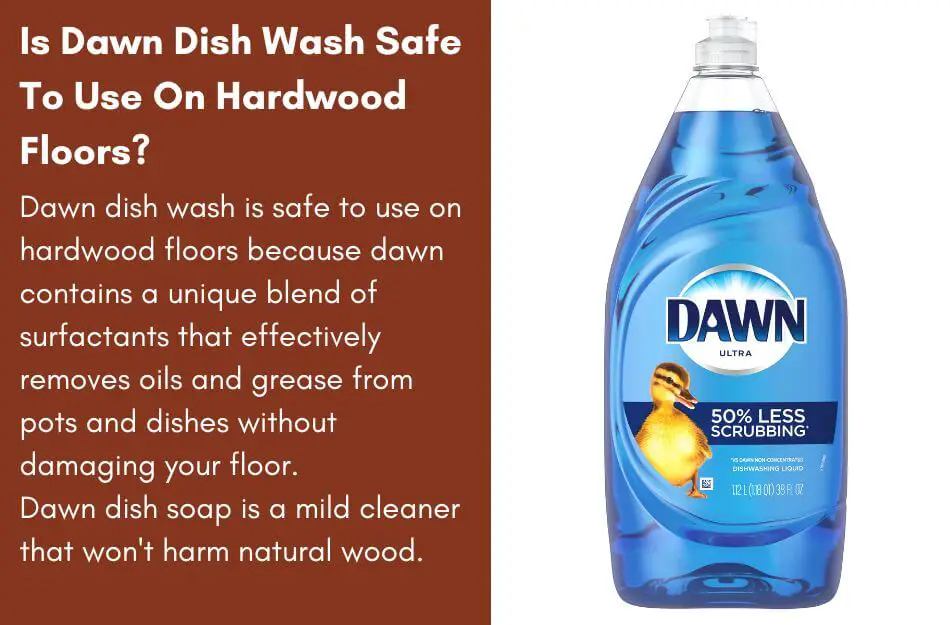
Dawn dish soap is a mild cleaner that won’t harm natural wood and is ideal for small tasks and routine maintenance.
The issue is more complex than it seems, though. If Dawn dish soap is not used properly and securely, it can permanently damage wood floors.
Safe Use Of Dawn Dish Soap
When cleaning hardwood floors with dawn dish soap, keep the following in mind to prevent damage:
- Avoid using boiling water
- Avoid using too much dish wash
- Blotting up spills right away
- Drying the floor as soon as you can after cleaning
Can You Use Vinegar With Dawn On Hardwood Floors?
You can use Dawn with vinegar. As long as you don’t use heavy formulations or cleanse with them too frequently, vinegar, despite being acidic, is an excellent cleaning agent that you can use on hardwood floors.
Remember only to use them together once a month and only to use them for thorough cleaning. It can ultimately wear down the coating on the hardwood floors from repeated use.
Using the recommended amount of vinegar with dawn is suggested because too much solution can harm your hardwood floor.
You should combine 1 gallon of water and 1/2 cup of distilled white vinegar. Then, add a few drops of Dawn dishwashing liquid for a fresh scent and more cleaning force.
Explore: What Not To Use On Hardwood Floors? 21 Things To Avoid
How Do You Clean Hardwood Floors with Vinegar And Dish Soap?
When combined with other dish soaps, vinegar may disinfect a floor, revive its original luster, and shine.
The following steps explain how to make the ideal cleaning option for your hardwood floors by combining vinegar and dish soap.
Wood Floor Cleaning Prep
Use a broom with soft bristles, a microfiber mop, or a damp mop to remove grime and debris around the ceilings, baseboards, and edges before sweeping or wetting the wood floor.
To finish, move the dirt from one edge of the space to the other till it is all gathered in one spot.
Dust off the grime with a dustpan before throwing it away. As long as the beater bar has been removed, you can clear the floor.
The wood may be harmed when vacuuming a wooden floor while the beat bar is still in place. When cleaning, be sure to reach the corners of the floor to get rid of any dust or grime that may be there.
There are some conditions in which the vinegar can be harmful to wooden floors. I have written a comprehensive article The Surprising Way Vinegar Can Damage Your Wood Floors that I encourage you to read.
Wipe Down the Whole Floor Using Vinegar and Dish Soap
You should combine dish soap and vinegar in a spray container. Shake the container gently to mix without producing an excessive amount of suds.
Use a soft sponge to remove grime and debris after applying the vinegar solution to the floor, particularly dirty areas.
The following procedure, which uses a basic vinegar, dishwashing liquid solution, and a wet mop, is the simplest method to clean wood floors.
Weekly maintenance cleaning is perfect for this cleaner formula. Using a microfiber towel and this recipe, you can also clean the baseboards that run along the floor.
Rinse the Solution
Remove soapy debris by rinsing and wringing out the sponge in cold water. You may additionally employ a wet mop to eliminate the cleaning solution for bigger areas.
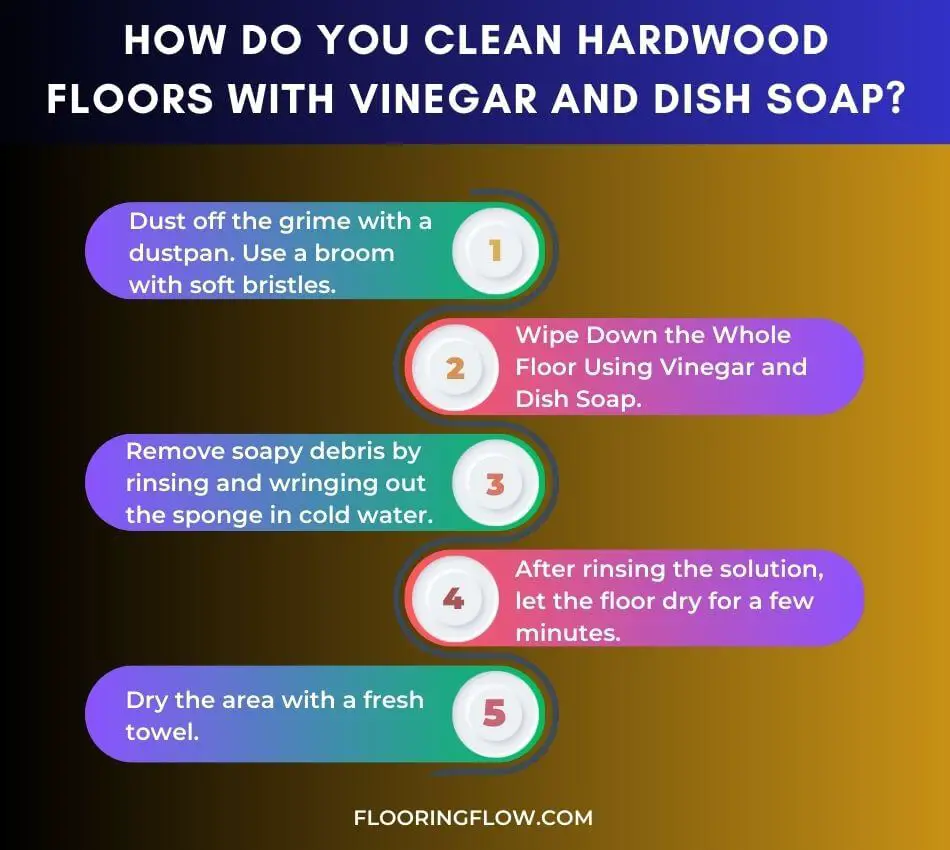
Let It Dry
After rinsing the solution, let the floor dry for a few minutes. The best way to dry the wooden surface after cleaning it is with a dry towel because standing wood and water don’t get along.
If left wet, wood surfaces can become warped and damaged, requiring expensive repairs. So, to conclude, dry the area with a fresh towel.
Cleaning Hardwood Floors With Dish Soap
Cleaning the hardwood floor with Dawn is relatively easy, particularly if you follow the instructions. Here is a step-by-step guide to cleaning hardwood floors with dawn to help you maintain your floors spotless:
Thorough Sweeping
Sweeping the place you’re about to clean thoroughly is the first thing to do. Daily, dirt particles collect throughout the home and settle in every crevice.
The buildup rate may even quadruple if you reside near a busy roadway or have pets and people living in your home.
Occasionally, even rug cushions can’t stop the floor from becoming completely dusty. If you begin cleaning without clearing away all of the fine dust then the floor will quickly become muddy.
Therefore, to prevent that, you should dust the rug pads and sweep the floor with a mop or soft bristles.
Don’t Miss: How Often Should You Clean Hardwood Floors (Revealed)
Preparing The Solution
Making the cleaning solution is the following basic action. Many prefer combining liquid dish soap with other cleaning agents like lemon juice and ammonia to guarantee thorough cleaning.
However, Dawn only requires thorough cleaning since it is a very effective cleaning product.
Additionally, since they harm the sealants, you shouldn’t use corrosive substances like ammonia on wooden floors. The only ingredients in the formula should be water and Dawn dish soap.
Use three parts freshwater and one part dawn for optimal results. For appropriate dilution, a 3:1 ratio of water to Dawn must be used.
In this manner, the combination will be smooth and have the right amount of power to clean the wooden floors.
Gentle Wiping & Scrubbing
As mentioned above, you should wipe the surfaces with Dawn detergent using soft cloths or microfiber mops as you don’t want to leave tiny scratch marks on expensive hardwood surfaces with brushes having rough bristles.
Even if you’re using soft brushes, you should refrain from scrubbing too vigorously. Treated floors, particularly those that have been oil-curated, have highly glossy surfaces.
Scrubbing too vigorously runs the danger of harming the hardwood floors’ protective layers. Scrub and remove the dirt with soft motions.
There are better answers than forceful scrubbing concerning solid or engineered oak floors.
So, if you’re having trouble eliminating a dirty place, give it a short soak. Once the dirt has sufficiently loosened, you can scrub it off.
Drying and Polishing the Surface
Never use a mop or sponge completely drenched in water, as this will damage your hardwood surfaces.
Use another clean and dry cotton or microfiber towel that can be kept in addition to the standard cleaning sponge.
Use the other cloth or mop to remove extra water from the surfaces after cleaning the wooden floors with the Dawn absorbent sponge.
Take your time drying the area by gently patting it down. In addition, many individuals tend to polish their surfaces after thoroughly cleaning them.
For instance, you can reclaim some of the floor’s shine if it has been coated with oil-based polyurethane by applying a layer of linseed oil.
Does Dish Soap Ruin Hardwood Floors?
Dish detergent is a gentle disinfectant that won’t ruin hardwood floors however using too much dish soap can cause spots on your floor or it can also damage your hardwood floor.
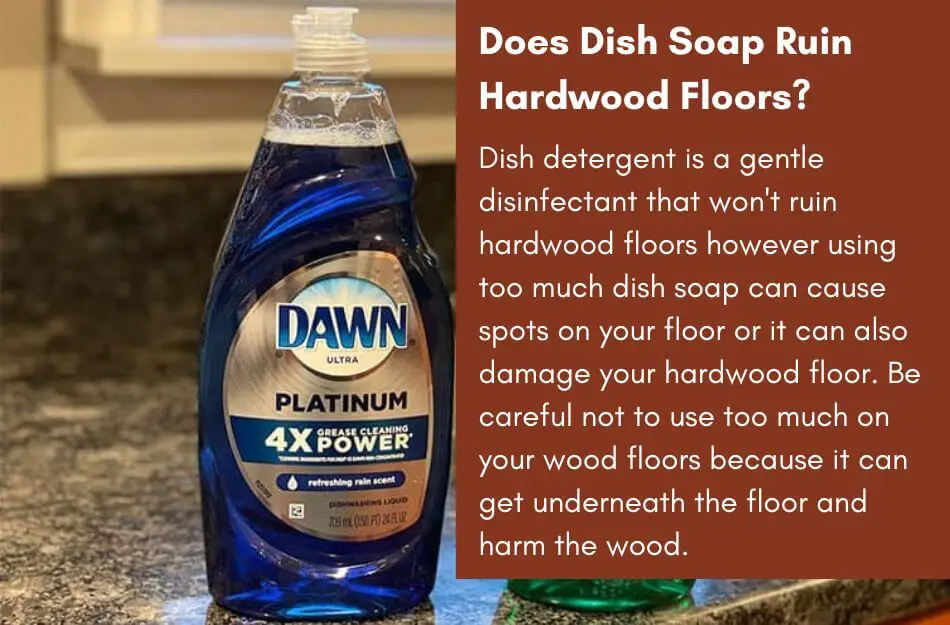
Be careful not to use too much on your wood floors because it can get underneath the floor and harm the wood.
However, some cleaning advice and recipes will show you how to clean hardwood floors with dish soap to preserve the wood naturally without ruining it.
Cleaning hardwood floors improperly could be a mistake.
Can You Use Blue Dawn on Hardwood Floors?
Blue Dawn is completely safe for wooden floors so you can use it on them or any other flooring surfaces.
Since blue dawn dish soap has more grease-removing ability per drop, you can scrub your entire floor with less soap.
No matter what dirt is on your surface, Blue Dawn dishwashing liquid will always leave it spotless. However, there are some warnings that it might hurt the eyes.
Avoid letting it irritate your eyes. Also, keep it out of children’s grasp because they may accidentally swallow it.
Drink a tumbler of water to dilute if accidentally swallowed because it contains anionic surfactants. If it goes into your eyes, flush it for 15 minutes with water.
Is Dawn Dish Wash The Best Hardwood Floor Cleaning Product?
Everyone knows that Dawn is excellent for cleaning plates, pans, dishes, and crystals. However, diluted Dawn dish soap with water best cleans hardwood floors in most houses.
Not optimal because dishwashing detergent includes foam stabilizers that might make removing it from a floor difficult, given that the mop tends to leave a trail of suds behind after each stroke.
It is also considered the best cleaning product because it requires basic steps and basic cleaning equipment.
The only equipment you require is a mop, vacuum, and brush. The finest mop for hardwood floors is a flat-head or thread mop made of microfiber that is simple to wring out.
Even unique hardwood floors can be kept clean without special cleaners or maintenance techniques.
Knowing which products to use on hardwood floors is as essential as knowing what to use to clean them because wooden floors are made of natural materials.
Can You Use Dawn Dish Wash On All Surfaces?
Unexpectedly, dish soap makes an excellent floor cleaner, so it can be used on many different surfaces like tiles, vinyl, and stone are just a few flooring materials that you can clean.
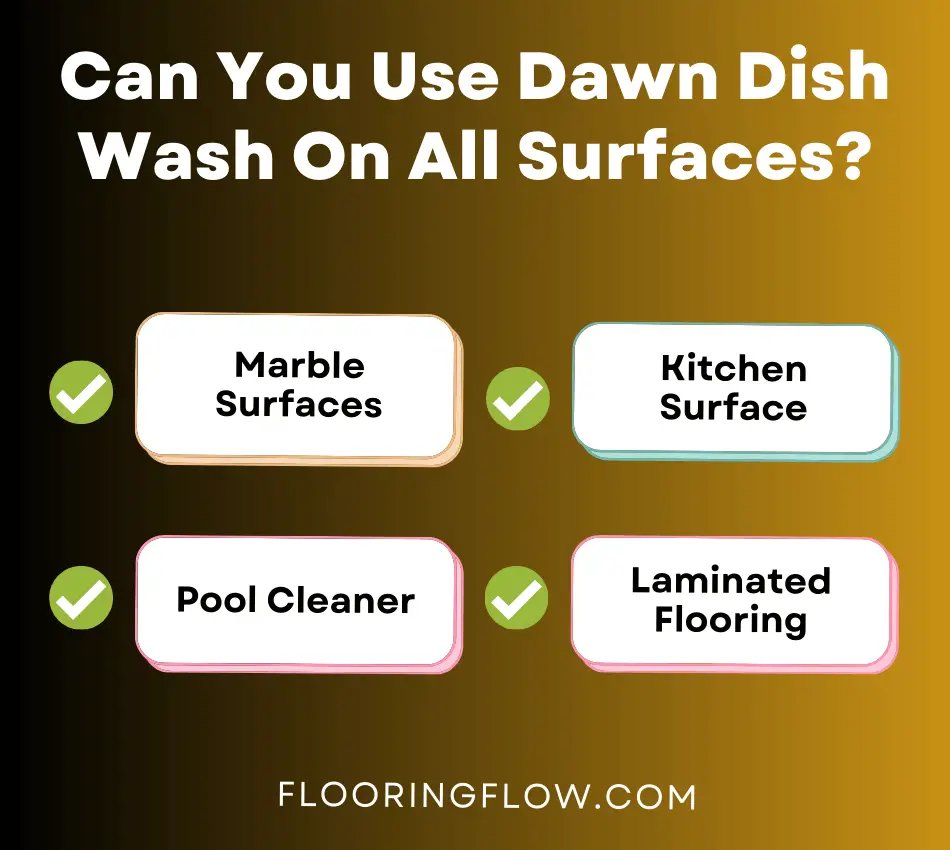
Marble Surfaces
You can safely clean marble with a small quantity of Dawn dish soap, such as Dawn, combined with water.
Be careful not to use a detergent that is harsh or includes acidic ingredients, such as lemon juice.
A marble cleaner can be created by mixing water and Dawn dish soap in a spray container or using marble-specific cleaners. The important marble product, calcium carbonate, is easily stained and etched.
Make careful to blot up spills to prevent stains quickly. Use a soft cloth and stone cleaner to wipe the region quickly.
Marble surfaces can also be cleaned with mild soap and water and dried with a soft cloth.
Clean The Oil On Your Kitchen Surface
Clean up the oil stains in your kitchen with a dawn dish wash. Scrub away the layer of oil that accumulates on the stove, ceiling, walls, cupboards, or nearly anything else by filling your basin with hot water, adding some dawn dish soap, and doing so.
To avoid harming any of these surfaces, use a gentle sponge.
Dawn dish detergent is a fantastic all-purpose cleaner that doesn’t contain any nasty chemicals, so use it wherever there is clutter in your kitchen!
Pool Cleaner
Pour some Dawn into the pool’s center surface. The pool’s edges will attract all the dust, pollen, and suntan lotion, where you can scoop it up.
With so little work, you can spend the day unwinding by your immaculate pool. This trade seems to be a sensible one.
Laminated Flooring
You can also use Dawn dish soap on a laminated surface and make it shine like a new floor. Dawn is more versatile and is an all-purpose magic cleaning product.
A teaspoon of clear, dawn dish wash can be dissolved in a liter of water and cleaned with a cloth or mop.
Your hardwood floor will be shiny and spotless in a very short time. On laminated floors, dish soap works wonders.
Is Dawn Dish Soap Toxic?
Dawn dish soap includes toxic substances like Triclosan, synthetic dye, 1,4-dioxane, fragrance, and the horrible methylisothiazolinone, so sometimes it is considered a toxic detergent.
These ingredients can bring skin irritation, liver damage, allergic reactions, and moderate to serious health conditions.
Dawn soap poisons the water, making it toxic to animals, particularly aquatic life. This cleaning solution includes 1,4-dioxane, known to contaminate or pollute water.
The ingredients may also harm aquatic life which would upset their ecosystem’s delicate equilibrium.
It can all impact reproduction, breathing, feeding, and living. It might also have negative impacts when it meets sensitive or reactive skin.
Can Dawn Remove Thick Layers Of Dirt Without Harming The Hardwood Floors?
Dawn is well known for removing a lot of grime in just one cleaning and wiping exercise. It is incredibly effective at quickly disintegrating fatty substances and elements.
However, the sealants are not impacted by Dawn’s dissolving agents as rapidly. Therefore, corrosion should only occur if the acidic liquid is left on the surface for a very long period.
Should Dawn Dish Soap Sit For Several Hours If The Floor Looks Dirty?
Leaving caustic substances like dawn dish detergent on wooden floors for an extended period has both benefits and drawbacks.
Leaving corrosive substances on wooden floors is generally not advised because they can harm sealants like polyurethane linseed oil.
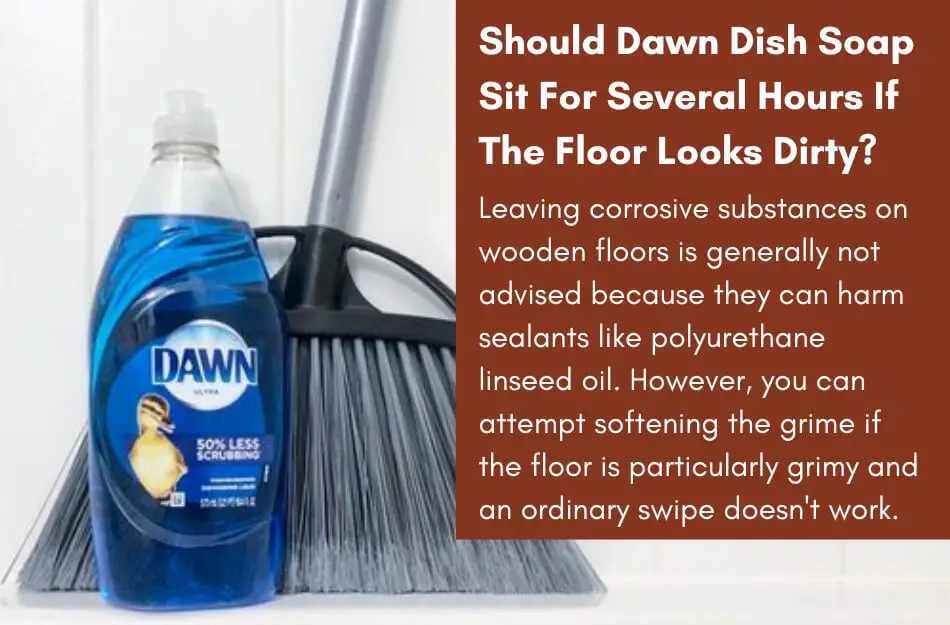
However, you can attempt softening the grime if the floor is particularly grimy and an ordinary swipe doesn’t work.
But only with continuous oversight and not for hours. To remove the remaining grime, use microfiber sponges to loosen the previous layers after soothing the area for some minutes.
Final Thoughts
So, is Dawn safe to use on wooden floors? Yes, you can use it because it works well for quick clean-ups to give you a quick response.
But Dawn can also harm hardwood surfaces like most other liquid cleaners. Therefore, it’s crucial to use care when using it.
Avoid using Dawn or other liquid cleansers if you notice sealant cracks or untreated wood floors. Additionally, put on gloves to protect your hands while washing.

As a co-creator of FlooringFlow.com, Emma Sophia comes on board to answer all your questions related to any flooring problems. Together with John Henry, she’s gained extensive experience in fixing many flooring problems in their own house as well as in friends and family’s. Now, she wants to share her knowledge that she gained during floor remodeling, restoring, and DIY projects.

